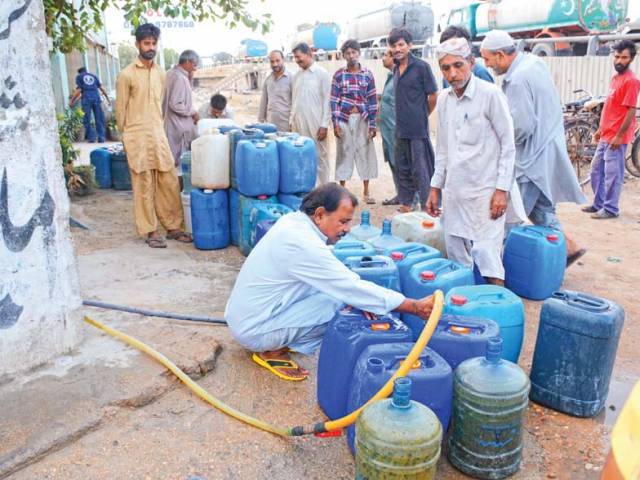
This was decided in the third meeting in recent weeks on water and sanitation in Sindh, presided over by Chief Minister Murad Ali Shah on Saturday.
Briefing the meeting, the Planning and Development Board Chairperson Mohammad Waseem said 21 districts of Sindh, which did not include Karachi, generated 100.45 million gallons of municipal, industrial and hospital sewage per day and discharged it from 755 points into clean water sources.
SC wants district-wise reports, cutoff dates for water and sanitation projects
The meeting was informed that 0.38MGD of sewage was discharged through Jacobabad district into water bodies through 10 points, 5.82MGD from Kashmore through 10 points, 5.15MGD from Kamber-Shahdadkot through 87 points, 3MGD from Larkana through 135 points, 0.53MGD from Shikarpur through 35 points, 3.05MGD from Ghotki through eight points, 5.84MGD from Khairpur through 76 points and 29.5MGD from Sukkur through 100 points. Apart from this, 6.62MGD will be discharged from Badin through 19 points, 0.19MGD from Dadu through 30 points, 10MGD from Hyderabad through 70 points, 3.7MGD from Jamshoro through nine points, 1.09MGD from Matiari through eight points, 0.06MGD from Sujawal through two points, 4.8MGD from Tando Allahyar through 18 points, 3.91MGD from Tando Muhammad Khan through nine points, 0.22MGD from Thatta through six points, 0.22MGD from Mirpurkhas through 20 points, 7.02MGD from Sanghar through 10 points, 6.44MGD from Naushero Feroz through 43 locations while 2.9MGD of sewage was discharged from Shaheed Benazirabad district through 50 locations.
It was decided during the meeting that 28 treatment plants would be installed for treating industrial effluent in Sukkur, Kotri, Hyderabad, Nawabshah, Thatta, Sujawal, Jamshoro and other locations. The plants would cost around Rs9.61 billion, the meeting was informed.
The CM was told that treatment plants in Ghotki and Hyderabad were not included in the amount because the plants in both the districts had already been approved under the Annual Development Programme.
Shah said he wanted the treatment plants to be completed by mid 2019.
PFA to ban wastewater use for edible crops
Speaking about the Greater Karachi Sewerage Plan (S-III), Waseem said it was a Rs36.12 billion scheme that would treat 460MGD of waste water. The PC-I for the project had been cleared by the Capital Development Working Party and later the Executive Committee of National Economic Council also approved its revised PC-I, he said.
The meeting was informed that 460MGD of sewage was discharged from Karachi, which included 363MGD of municipal sewage, 3MGD of hospital sewage and 94MGD industrial sewage.
Discussing the K-IV project, Local Government Minister Jam Khan Shoro said the population of Karachi was 16.05 million, including 14.91 million urban and 1.14 rural population. Total water requirement of Karachi was 802.6MGD, the local government minister said, adding that the existing supply was 650MGD. The financial progress of the K-IV project was 27% and physical progress was 30%, Shoro said.
The CM directed Karachi Water and Sewerage Board Managing Director Hashim Raza Zaidi to start working on the construction of a 100-megawatt power plant. He also directed him to start negotiating for acquiring a rental power plant so that the K-IV project could start in 2019.
SC orders inquiry into Mehmoodabad treatment plant's land allotment
Shah was informed that five treatment plants in Hyderabad were being rehabilitated at a cost of Rs1.52 billion to treat 62MGD of sewage. The projects included the rehabilitation of a new treatment plant of 30MGD at a cost of Rs154.53 million, rehabilitation of an old 10MGD treatment plant at a cost of Rs195.04 million, rehabilitation of the Hala Naka treatment plant of 8MGD at a cost of Rs185.09 million and rehabilitation of the 8MGD Preetabad Treatment Plant at a cost of Rs189.78 million. The projects would be completed by December 2018, Shah was told, while the Hussainabad Treatment Plant of 6MGD would start operations in June 2020.
The meeting was also attended by Public Health Engineering Minister Fayaz Ali Butt, Chief Secretary Rizwan Memon, Principal Secretary to the CM Sohail Rajput, Health Secretary Dr Fazlullah Pechuho, Irrigation Secretary Jamal Shah, Industries Secretary Rahim Soomro, Sindh Environmental Protection Agency Director-General Baqaullah Unar and others.


















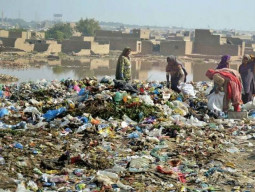

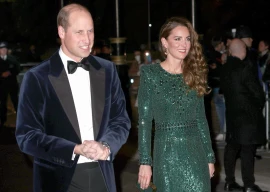

1714480213-0/ojwilson-(5)1714480213-0-270x192.webp)

1714478350-0/ojwilson-(4)1714478350-0-270x192.webp)




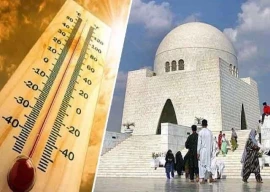
-(1)1714378140-0/AliAminMaryam-(4)-(1)1714378140-0-270x192.webp)
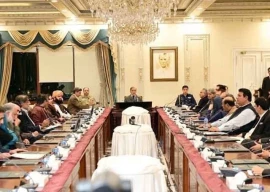
1714370039-0/ojwilson-(1)1714370039-0-270x192.webp)







COMMENTS
Comments are moderated and generally will be posted if they are on-topic and not abusive.
For more information, please see our Comments FAQ